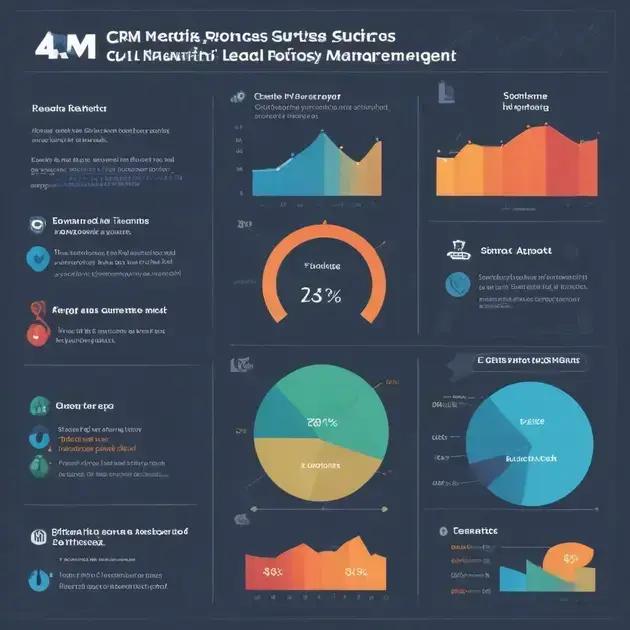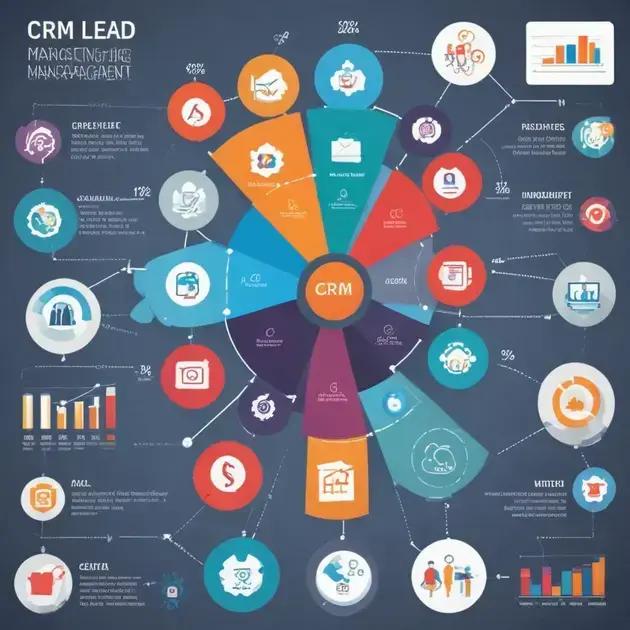CRM and lead management are crucial for optimizing customer relationships and boosting sales. These systems help businesses effectively manage customer data, automate tasks, and drive personalized marketing efforts, ultimately improving conversion rates and fostering long-term loyalty.
CRM and lead management play a crucial role in today’s competitive business landscape. By leveraging effective strategies, companies can enhance sales processes and improve customer relationships. In this article, we will delve into the intricacies of CRM, explore best practices for managing leads, and look into future trends that can shape the way businesses engage with their customers.
Understanding CRM Systems
Understanding CRM systems is essential for businesses looking to enhance their customer relationships. A Customer Relationship Management system helps organizations manage interactions with potential and existing customers efficiently.
What is a CRM System?
A CRM system is a technology that allows companies to streamline processes, build customer relationships, and improve customer engagement. By storing customer information, sales data, and communication history in one place, businesses can easily access relevant information at any time.
Key Features of CRM
Most CRM systems include features such as contact management, sales pipeline tracking, automated reporting, and lead management tools. These features work together to help businesses gain insights into customer behavior, preferences, and needs.
Benefits of Using CRM
Utilizing a CRM system can lead to increased sales, better customer service, and improved communication within the team. When employees have access to up-to-date customer information, they can respond to inquiries more quickly and effectively.
Types of CRM Systems
There are three main types of CRM systems: operational, analytical, and collaborative. Operational CRMs focus on automation of sales and marketing processes. Analytical CRMs analyze customer data to improve business decisions. Collaborative CRMs enable different departments to share customer information seamlessly.
Choosing the Right CRM System
Selecting the right CRM requires understanding your business needs. Consider the size of your team, your specific goals, and the features that will benefit you the most. Many CRM vendors offer free trials, allowing you to test the software before committing.
Lead Management Best Practices

Effective lead management is crucial for maximizing sales and ensuring that potential customers are nurtured throughout their journey. Implementing best practices for lead management can significantly improve your conversion rates and customer satisfaction.
Centralize Lead Data
Start by centralizing all lead data in your CRM system. This ensures that your team has access to accurate and updated information, allowing for better follow-up and personalized communication. Tracking lead details such as contact information, source, and interaction history is critical.
Qualify Leads Effectively
Implement a lead qualification process to determine which leads are most likely to convert. Criteria may include demographic information, engagement level, and expressed interest. Focusing sales efforts on qualified leads helps maximize efficiency and improves chances of success.
Automate Follow-Ups
Utilize automation tools in your CRM to set up follow-up reminders and emails. Automating this process ensures that no lead falls through the cracks and enables timely communication, which is vital in nurturing leads.
Engage with Personalized Content
Creating personalized content for each lead enhances engagement. Use data from your CRM to tailor messages and offers according to the interests and preferences of your leads. This approach makes leads feel valued and increases the likelihood of conversion.
Analyze Lead Performance
Regularly analyze your lead management efforts to assess what strategies are working and which need improvement. Use metrics such as conversion rates, time to convert, and feedback from sales teams. This analysis can lead to more informed decisions and better overall strategies.
Integrating CRM with Marketing
Integrating CRM with marketing is essential for creating a seamless customer experience and maximizing the effectiveness of marketing campaigns. This integration allows businesses to collect and utilize customer data efficiently, improving engagement and conversion rates.
Benefits of CRM and Marketing Integration
By aligning CRM systems with marketing strategies, companies gain a unified view of customer interactions. This leads to more targeted marketing efforts and better understanding of customer needs and behaviors. With integrated data, businesses can tailor campaigns to specific audiences, increasing the likelihood of success.
Streamlining Data Management
Integrating CRM with marketing platforms enables streamlined data management. All customer data, including contact details, purchase history, and engagement metrics, can be stored in one central system. This reduces the need for manual data entry and minimizes errors, ensuring that both marketing and sales teams have accurate information.
Personalizing Marketing Efforts
Using CRM data allows marketers to create personalized content that resonates with customers. By analyzing previous interactions and preferences, marketing teams can design campaigns that speak directly to customer interests, significantly increasing engagement rates.
Automating Marketing Campaigns
Integration facilitates automation of marketing campaigns. For instance, automated email workflows can be set up to send targeted messages based on customer behavior. This not only saves time but also ensures timely and relevant communication with leads.
Measuring Campaign Effectiveness
By connecting CRM and marketing tools, businesses can measure the effectiveness of their campaigns in real-time. Metrics such as open rates, click-through rates, and conversions can be tracked, allowing for quick adjustments to marketing strategies based on data-driven insights.
Measuring Success in CRM and Lead Management

Measuring success in CRM and lead management is vital for understanding the effectiveness of your strategies and making improvements. By tracking the right metrics, businesses can evaluate their performance and drive better results.
Key Performance Indicators (KPIs)
Establishing Key Performance Indicators (KPIs) is crucial in assessing your CRM and lead management strategies. Common KPIs include conversion rates, lead response time, and customer retention rates. These metrics give insights into how effectively your team manages leads and nurtures relationships.
Data Analysis
Regularly analyzing data from your CRM system helps you identify trends and patterns. Look beyond basic metrics and dive into customer behaviors, such as purchase history and interactions. This analysis can uncover opportunities for improving customer engagement and increasing sales.
Customer Feedback
Gathering feedback from customers is another way to measure the success of your CRM efforts. Surveys and reviews can offer valuable insights into customer satisfaction and areas where your service can improve. Understanding customer perspectives helps create a more tailored experience.
Reporting Tools
Utilizing reporting tools in your CRM allows for easy tracking of performance data. Customized reports can provide a clear picture of your strengths and weaknesses. Regularly reviewing these reports enables timely adjustments to your lead management strategies.
Continuous Improvement
Finally, measuring success is an ongoing process. Creating a culture of continuous improvement will help your team remain agile. Regularly reassess your metrics and strategies to ensure they align with your business goals and adapt to changing market conditions.
Future Trends in CRM Technology
The future of CRM technology is rapidly evolving, driven by advancements in technology and changing customer expectations. Staying ahead of these trends is crucial for businesses looking to maintain a competitive edge.
Artificial Intelligence Integration
Artificial intelligence (AI) is becoming a key component of CRM systems. AI can analyze vast amounts of customer data and provide actionable insights, allowing businesses to predict customer needs and behaviors. This leads to more personalized interactions and improved customer satisfaction.
Mobile CRM Solutions
As more people rely on mobile devices, mobile CRM solutions are gaining popularity. These platforms enable sales teams to access customer information and manage leads on the go, increasing productivity and responsiveness. Mobile access allows for real-time updates and communication, which is essential in today’s fast-paced environment.
Enhanced Data Security
With the rise of data breaches, data security is a top priority for CRM technology. Future systems will incorporate advanced security measures such as encryption, multi-factor authentication, and secure cloud storage. These enhancements ensure that customer information remains safe and builds trust with clients.
Automation Features
Automation is set to play an even greater role in CRM technology. Features such as automated lead nurturing and follow-up processes will streamline operations and allow teams to focus on strategic activities. Automating routine tasks can significantly improve efficiency and drive sales growth.
Integration with Other Business Tools
Future CRM systems will increasingly integrate with other business tools, including marketing automation platforms, social media, and e-commerce systems. This seamless integration allows for a holistic view of customer interactions, leading to better decision-making and an enhanced customer experience.
In Conclusion: The Importance of CRM and Lead Management
Using effective CRM and lead management strategies is essential for businesses looking to thrive. These systems help companies understand their customers better and manage relationships more efficiently.
By staying on top of trends like AI integration, mobile solutions, and data security, businesses can improve their customer interactions and drive growth.
Implementing these strategies not only enhances productivity but also fosters stronger connections with customers. Remember, effective CRM leads to better sales and happier customers, making it a vital part of any successful business.
FAQ – Frequently Asked Questions about CRM and Lead Management
What is CRM and why is it important for my business?
CRM, or Customer Relationship Management, helps businesses manage customer interactions and data effectively, leading to improved relationships and increased sales.
How can lead management improve my sales process?
Effective lead management helps identify and nurture potential customers, ensuring timely follow-ups and increasing the likelihood of conversion.
What are some best practices for lead management?
Best practices include centralizing lead data, qualifying leads, automating follow-ups, and using personalized content to engage prospects.
How can I measure the success of my CRM strategies?
You can measure success by tracking Key Performance Indicators (KPIs) such as conversion rates, customer retention rates, and feedback from clients.
What future trends should I be aware of in CRM technology?
Future trends include increased AI integration, mobile CRM solutions, enhanced data security, and more automation features.
How can businesses ensure data security in their CRM systems?
Businesses can enhance data security by using encryption, multi-factor authentication, and secure cloud storage methods.




